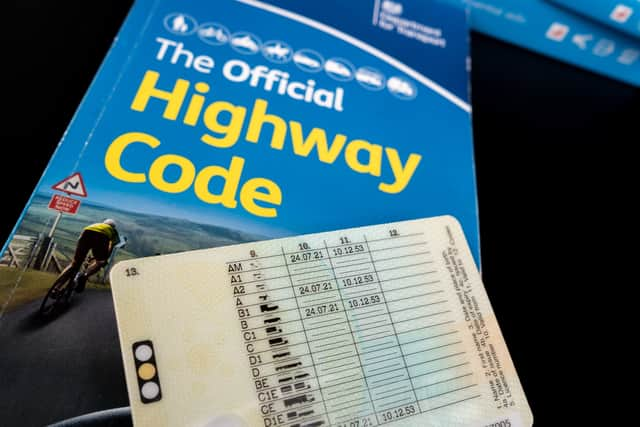Driving theory test: expert’s tips for passing, from practice questions to learning the Highway Code
and live on Freeview channel 276
Every year almost 2.5 million people sit the driving theory test in preparation for getting their driving licence.
For many, the theory test is less intimidating than the practical test that follows, but it still isn’t straightforward and around half of all candidates fail, so it’s important to be prepared. With huge waiting lists, passing your theory test first time means you’ll be able to book your practical test sooner, as well as avoiding the added time and cost of a resit.
Advertisement
Hide AdAdvertisement
Hide AdWhile there’s a lot to learn for the theory test, Tom Hixon, head of instructor support at Bill Plant Driving School, says the key to passing is proper preparation. He told NationalWorld: “First-timers have a higher chance of passing the multiple choice section if they study smartly.
“You should spread out your revision, allotting time each week to review your practice materials to ensure you understand all the theories. Be sure to utilise all available online resources.”
To help learners we asked Tom for his top tips on how to pass the theory test at the first attempt.
Get to grips with the Highway Code
Available online for free, the Highway Code forms the basis of most of the multiple-choice section, so be sure to spend a few hours working your way through it. Remember, the rules are updated whenever there are changes in the law, so make sure you’re studying the most recent version.
Spread out your revision


Advertisement
Hide AdFor the multiple-choice section of the test, you will be given 50 questions from a bank of more than 1,000 so it’s vital to give yourself plenty of time to cover a wide range of subjects if you want to pass first time. The DVSA recommends spending at least 20 hours revising to be fully prepared, so be sure to spread out and pace your revision, instead of cramming at the last minute.
Advertisement
Hide AdTom adds: “The week before the test, it is worth spending around 30 minutes each day working on any areas you have flagged as weaknesses to ensure you are best prepared for your test.”
Complete mock tests
Completing online practice tests is a great way to get a feel for the sort of questions you’ll face in the real theory test and to identify any gaps in your knowledge. The DVSA’s website has mock theory tests for learners to try and there are also a number of driver training apps and websites to help with theory test preparation.
Practice while out driving
Understanding the Highway Code in a real-world context is one of the most effective practices for theory tests. Tom comments: “Whilst theory tests are often viewed separately from the driving test, having a practical understanding of the Highway Code will help you tackle the hazard perception section of the theory exam and make you feel more confident in test conditions.”
Advertisement
Hide AdIf you have access to an insured vehicle outside your regular driving lessons, ask a family member or other suitable supervisor to take you out and quiz you on road signs and hazards, or test you on scenarios when hitting the road.
Make use of your practice time
You will be given 15 minutes of practice time before your test and should use this to get used to the layout of the questions and the touchscreen. If something isn’t working properly or you are unsure about anything, raise your concerns during this time so they can be dealt with before your test starts.
Stick to one minute per question
Advertisement
Hide AdWith 57 minutes to complete 50 multiple-choice questions, you should allow yourself one minute to answer each question. This will leave you with a good amount of time to check your answers at the end of the test, and revisit any difficult questions, preventing you from spending too long on one answer.
Be early and don’t forget your provisional licence
Whilst preparation is important, if you turn up to the theory test centre without your provisional licence you will not be allowed to sit your test and will forfeit the £23 fee, so be sure to double check you have your licence before heading out. Also, give yourself plenty of time to get to the test centre without rushing. You don’t want to be late or arrive stressed-out from the journey.
Advertisement
Hide AdOne final piece of advice from Tom is to try to remain calm and believe in your knowledge. He adds: “Remember, you can rearrange your test up to 3 days before the scheduled date if you feel unconfident, but if you have studied hard and applied your knowledge to practical situations, you should be prepared and more than capable of passing.”
